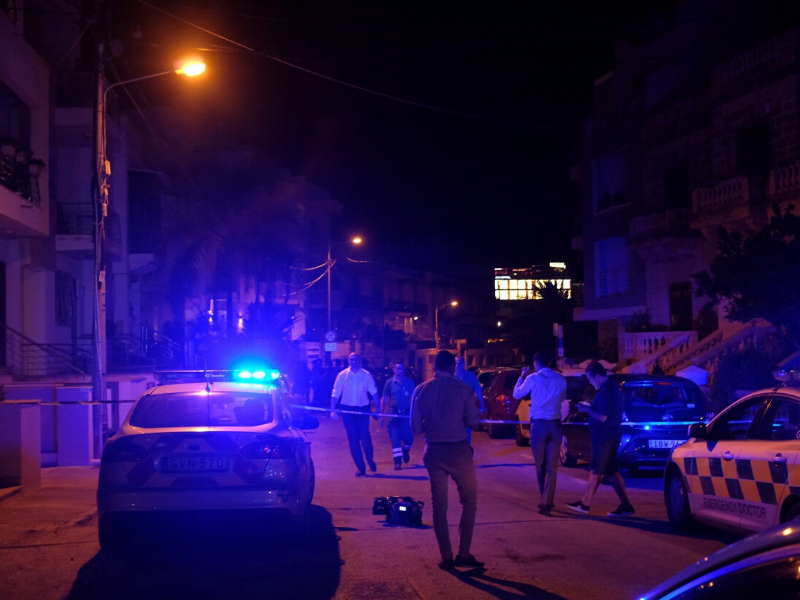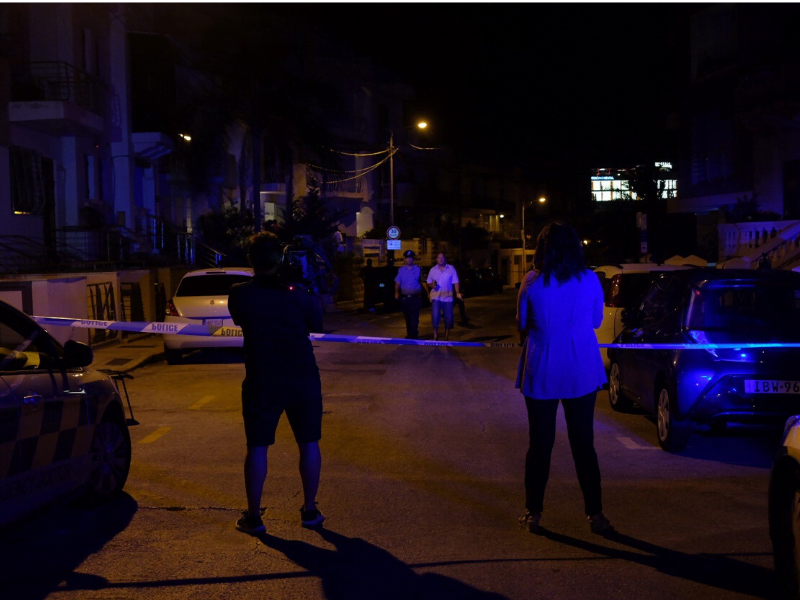The injuries suffered by Melvin Theuma, State witness in the investigation into the assassination of journalist Daphne Caruana Galizia, were “severe”, according to medical practitioners on duty at Mater Dei hospital on Tuesday night when he was found with a slit throat and a further six stabs to his abdomen, as well as cuts to his wrist.
Medical practitioners who spoke to The Shift on condition of anonymity said the type of wounds seen would send the individual into shock and likely to pass out. Shock, in medical terms, is the body’s last-ditch defence mechanism in case of severe trauma. Depending on timing, he may have been able to vocalise, with difficulty.
This is important because Police Commissioner Angelo Gafa told the press on Wednesday morning, only hours after the incident, that it was Theuma who told Inspector Keith Arnaud that the injuries were self-inflicted.
Medical practitioners at Mater Dei told The Shift: “His neck was in two pieces. The bottom of the thyroid was hanging loose. His jugular vein was severed.” His airway was punctured.
Such details were not entered into by the police commissioner during the press conference on Wednesday.
A statement by the police on Tuesday night, issued before Theuma had arrived at the operating theatre at Mater Dei hospital, said “the first indications show that it was self-inflicted”.
Asked to explain this during the press conference on Wednesday, Gafa said medics were present on site.

Police cars present outside Melvin Theuma’s apartment in Swieqi on 21 July when he was found with a slit throat, six stabs to his abdomen and cuts on his wrist. Photo: Joanna Demarco.
Forensic analysis that can arrive at such conclusions usually takes considerably more time, according to foreign forensic experts consulted by The Shift.
During the press conference held only a few hours later on Wednesday morning, the police commissioner again said “all indications” pointed to the injuries being self-inflicted, saying it was what Theuma had told them while lying on the floor after the injuries he sustained. He also said the police were still investigating.
The police commissioner said he does not think the incident showed shortcomings in the actions taken by the police. Gafa told the press there was no indication that Theuma had suicidal tendencies.
While fielding questions from the media, The Shift pointed out that Theuma has often made his distress visible in court. He had said that he suffered from depression, lived in fear, and, prior to being arrested had thoughts of ending his life. Theuma has also frequently broken down crying on the witness stand about his situation, saying that after the murder his “life was over”.
Theuma has been granted a presidential pardon by the government to reveal all. Since he turned State witness, the police have the responsibility of protecting him from both murder as well as potential self-harm. Yet the precautions put in place by the police did not prevent this from happening.
Gafa said the police were not present inside his home at the request of Theuma’s lawyers. He also said it was the police who made the decision, adding that Theuma is a “free man” and also had a right to privacy.
The police commissioner said the wounds were not defensive wounds and the blood was concentrated, showing that “there was no struggle”. He also referred to Theuma telling his partner to take the key as she left to collect the children not long before the incident.
“No one heard any conversation, apertures were all closed,” Gafa added.

Melvin Theuma, key witness in journalist Daphne Caruana Galizia’s assassination, was found at home with slit throat. Photo: Joanna Demarco
The police commissioner said Theuma was under police protection around the clock, with officers surrounding Theuma’s residence, a third-storey flat in a block of eight apartments in Triq is-Sirk, Swieqi, as well as “close protection” from the Special Investigation Unit as well as another two police officers in the basement of the building and at the main block. Theuma would only travel in a police car.
Asked about progress in implementing the Joint Investigation Team (JIT), Gafa replied that in order for the JIT to be implemented, there “needs to be a benefit for another country”.
“We are one with Europol,” the police commissioner said. He also mentioned that the investigations into the murder have uncovered other avenues for investigation, mostly through the devices which have been analysed throughout the investigation.
Any involvement by Europol in the investigation is different from the goals of a JIT – an established and effective cooperation tool among national investigative agencies when tackling cross border crime. JITs facilitate the coordination of investigations and prosecutions conducted in parallel across several States and assisted in the murder of journalist Jan Kuciak and his fiancée in Slovakia which occurred a few months after Caruana Galizia’s assassination.
During the compilation of evidence regarding the case against suspected mastermind Yorgen Fenech on Wednesday morning, occurring at the same time as the police press conference, Europol was again raised by court expert Alvin Cardona. The intervention was limited to instructions sent by email to Malta police on how to extract data from recordings Theuma filed in court on conversations he had.
The recordings were the subject of heated debate among the lawyers present for the prosecution and defence, with Fenech’s lawyers arguing that files had been “hidden or deleted”. This was met by strong objections by the prosecution while defence lawyers expressed reservation on procedures.
Cardona’s testimony did not inspire confidence in the police’s competence in handling the data, even resulting from the fact that they had to consult Europol on a basic measure.
The prosecution argued that the defence had the opportunity to access these files, listen to them and ask questions about them. Magistrate Rachel Montebello confirmed that Fenech’s lawyers had a “clone” of the data available to the court.
The magistrate pointed out that a magisterial inquiry had been launched following the incident on Tuesday. It is pertinent to note that magisterial inquests (inquiries into the ‘in genere’) are not launched on attempted suicides, but on crimes or suspected crimes carrying a possible prison sentence of more than three years, or an unexplained death. This means foul play has not been ruled out.
Meanwhile, The Shift is informed that Theuma is still in critical condition but stable. Perhaps Theuma himself is best placed to describe what happened on Tuesday night, if he survives.
The timing of the incident is worth noting. It occurred at a time when the defence for the suspected mastermind is claiming that evidence was withheld and the police may be implicated. The defence is stating that one of the recordings withheld shows Theuma has said he would pay off former police commissioner Lawrence Cutajar to acquire the pardon. Cutajar and Inspector Keith Arnaud have denied this in court.
“Whoever said that I was given money was either bluffing or lying,” Cutajar said in court when questioned on Wednesday.
Malta has a past with crucial witnesses disappearing while in police custody. One such case involved Ganni Psaila, known as ‘Il-Pupa’, who was found dead at the bottom of a building shaft in 1997 after turning State evidence. He had told the police that the submachine gun that was used in the drive-by shooting of Raymond Caruana was kept by “Il-Boton” (sometimes, “il-Botom”) in former Labour Minister Karmenu Vella’s official car and that this car formed part of the convoy of vehicles which drove round part of the island that night shooting at different Nationalist Party clubs, Caruana Galizia had reported.
Additional reporting by Joanna Demarco.













